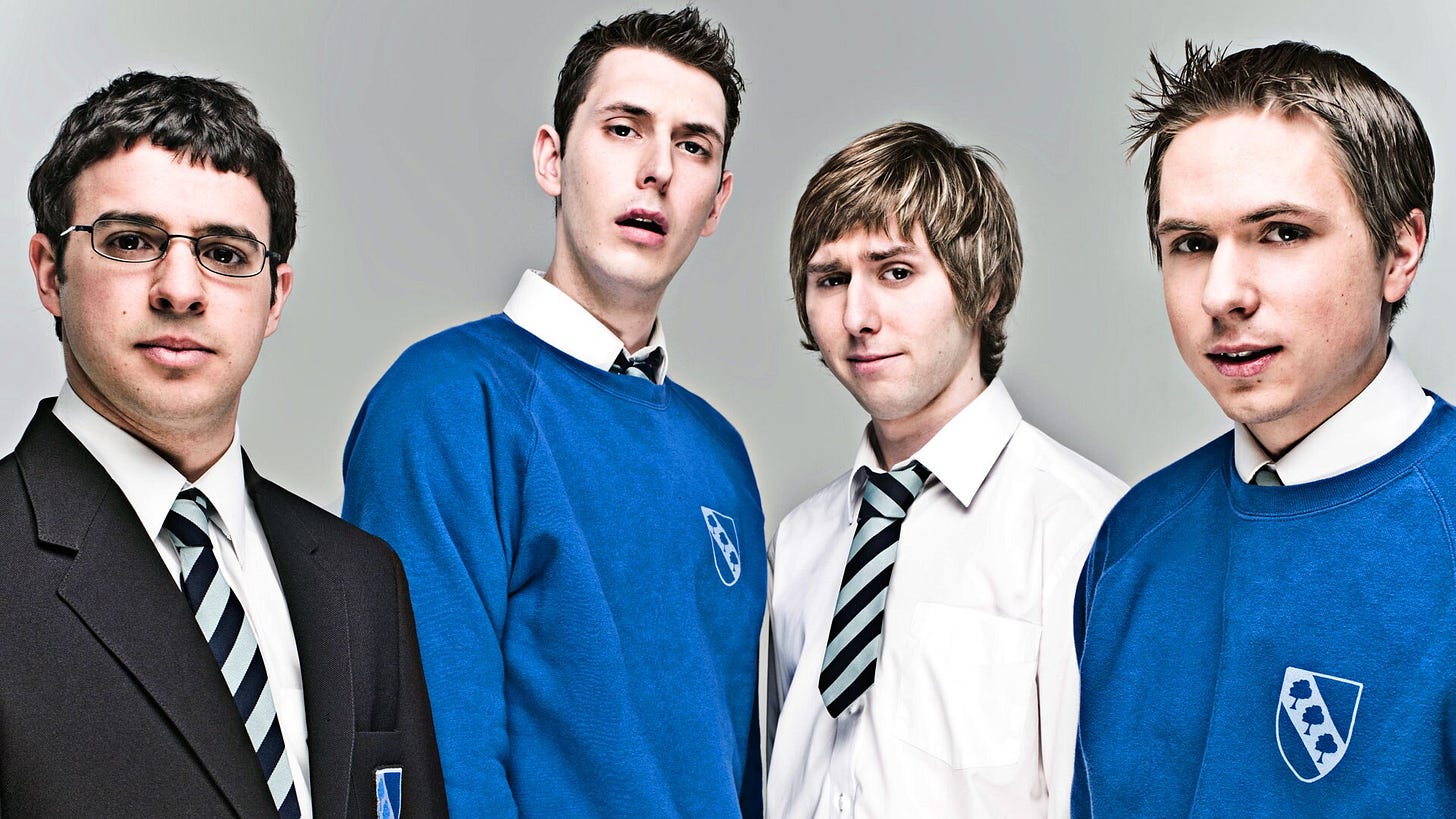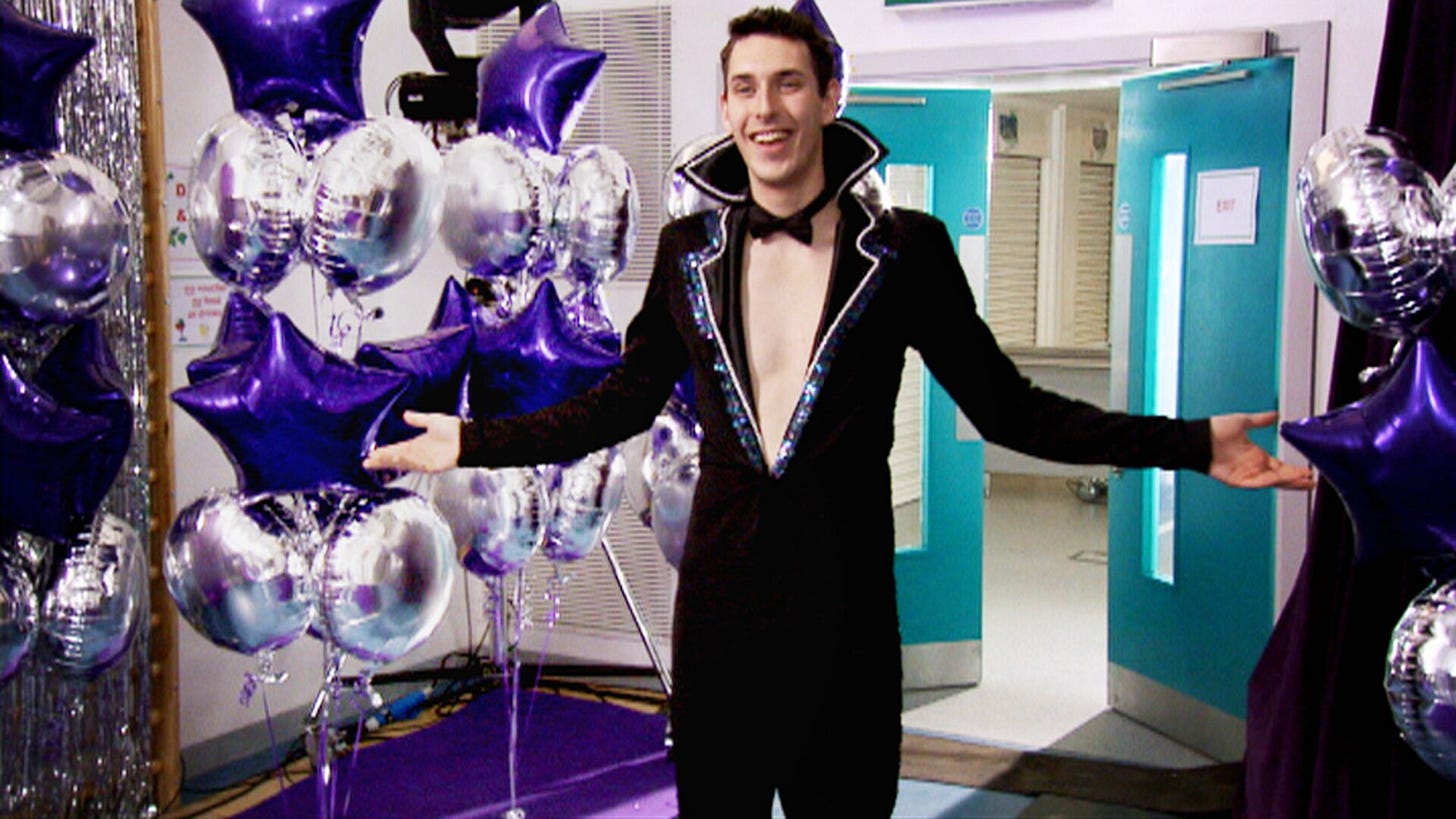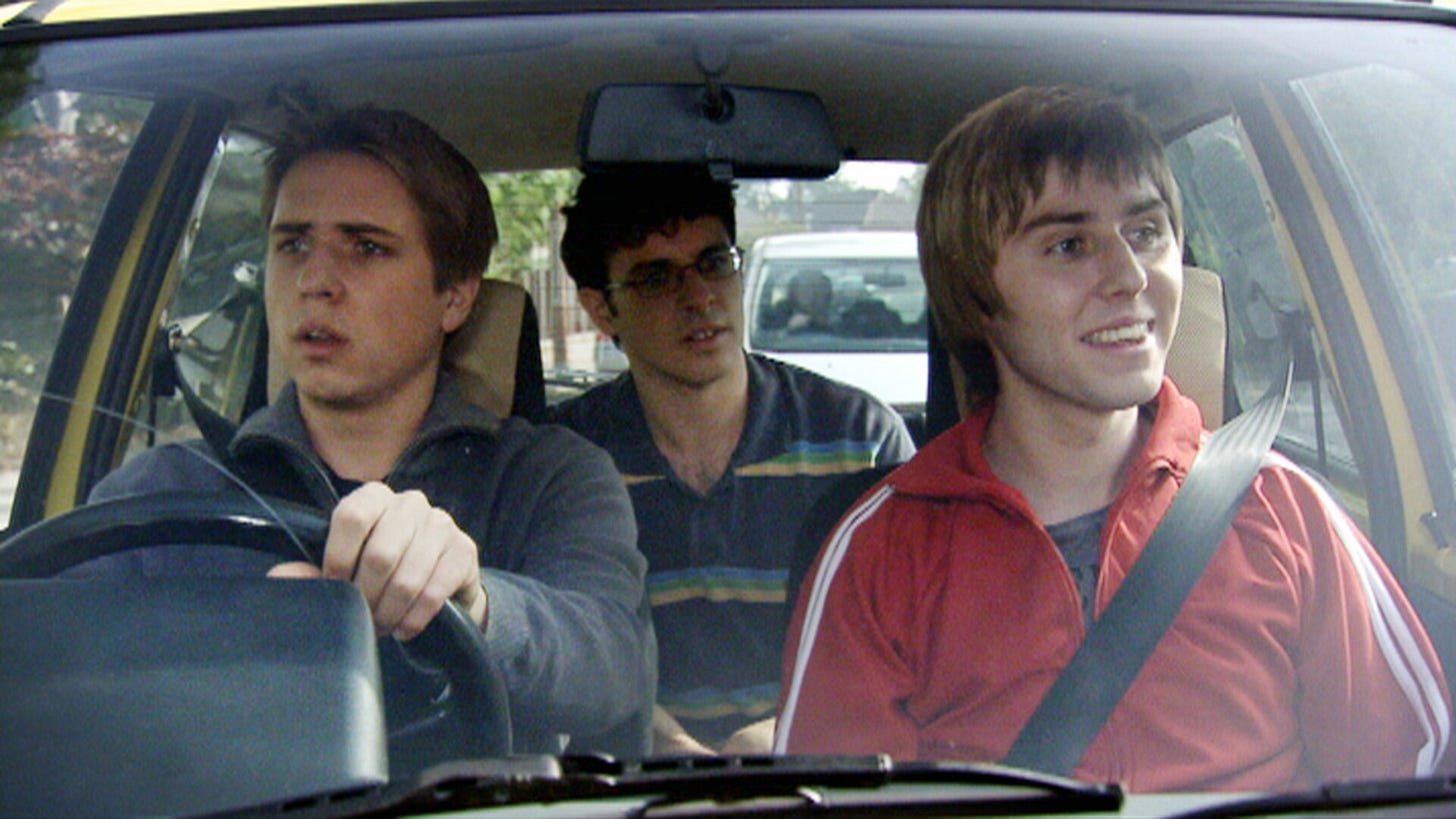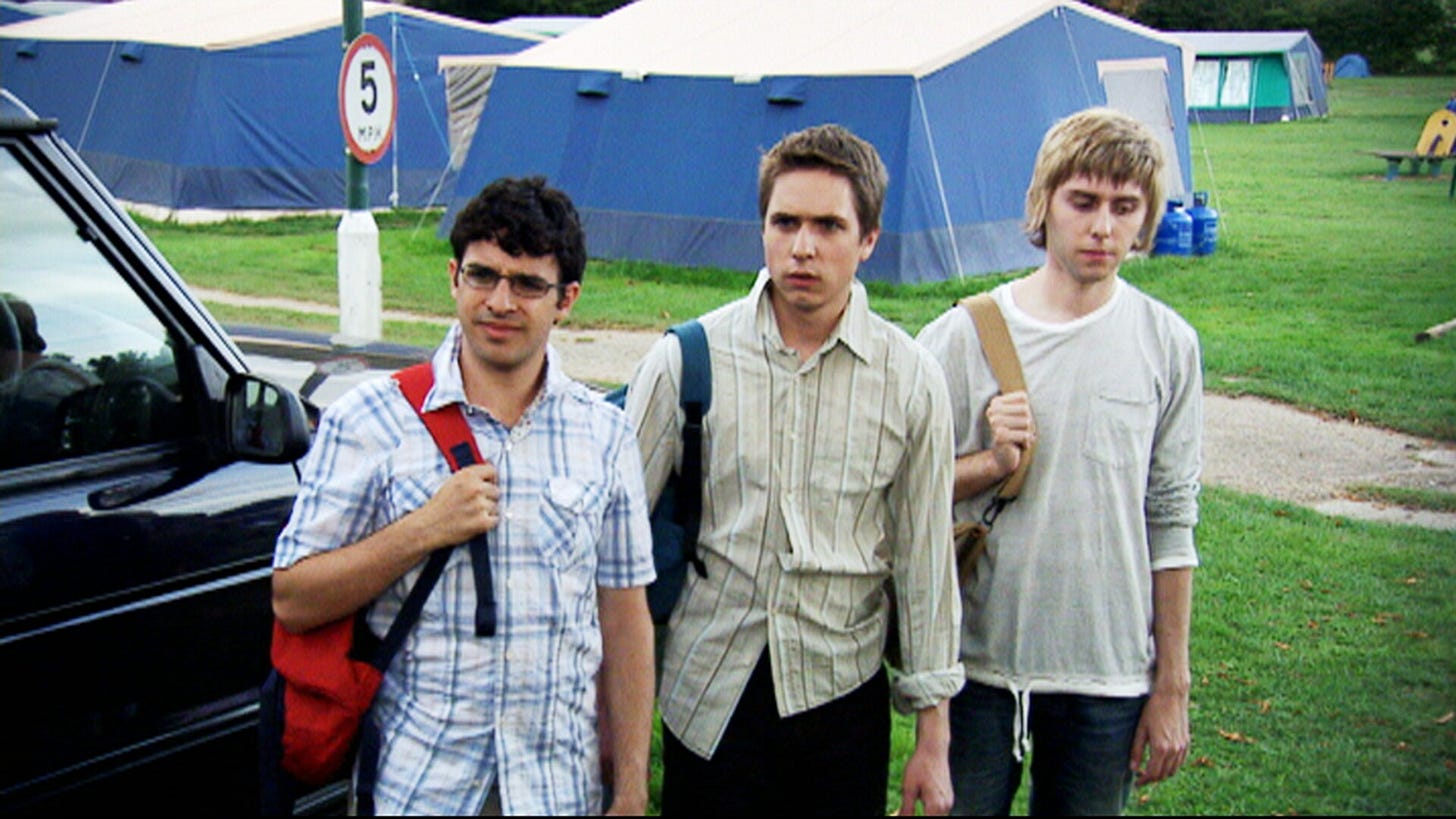In Celebration of The Inbetweeners
Truth and mundanity are difficult concepts for a TV show to capture, especially for a comedy. Almost every sitcom has at least some level of zany exaggeration and contrived coincidence. Seinfeld, famously described as ‘the show about nothing’, has episodes where a lead character is wrongfully arrested on suspicion of being a serial killer, a group of Japanese tourists are locked in a chest of drawers and two friends pretend to be hardened neo-Nazis to get a free limo ride. The founding ethos of The Inbetweeners appears to be a complete rejection of everything that you couldn’t reasonably expect to see or experience as a suburban British teenager. The show’s mission is to replicate the painful prosaic mundanity of adolescent suburban British life with excruciating accuracy. The result is the funniest sitcom I’ve ever seen, and perhaps the saddest too.
The Inbetweeners follows four central characters: dim, perverted fantasist Jay; unbelievably thick but constantly upbeat Neil; self-sabotaging budding intellectual Will and lovelorn, desperate Simon. The name of the show suits their small circle well. They aren’t popular and they aren’t total social rejects. They’re their own strange social island, broadcasting an off-putting vibe to their fellow students and constantly sabotaging themselves and each other. It’s a form of purgatory, the kind of co-dependent Sixth Form misery that requires University to change the status quo for everyone’s mutual benefit. The title could just as easily apply to the years 15-17 in the life of any teenager in the country. These are the in-between years, where you’re old enough to know what you can’t do yet.
What does the group do? In every overcast episode (you never do get a clear look at blue sky) they go to school, drive around in Simon’s desperately embarrassing yellow car and go to the shops. This is the show’s genius. It perfectly captures the stifling mundanity, frustration and boredom of adolescence. There is nothing to do and an eternity to do it in. The promise of a better reality - a world of girlfriends, popularity, clubbing and independence - appears so close at hand but remains a maddening mirage. The social order has already been set and there’s no changing it now. If a party’s going on, they haven’t been invited to it. As a person who spent his teenage years looking at other people’s teenage years online and playing Skyrim for 8 hours straight every day, I appreciate this blunt vision of adolescent dissatisfaction.
Consider the storylines of the individual episodes. The boys go to a disappointing party at a caravan park. They try to get served at a pub. They smoke one joint and freak out. They hide in a toilet after getting bullied at a disco. They go on a school field trip. Everything they do and everywhere they go is characterised by failure and disappointment. They’re living in the rain-soaked, dull, shy Tory vision of Britain that you see when you step outside your door. I want to write this piece without it devolving into a list of funny quotes and memorable scenes, because I may as well just copy and paste the scripts of all 18 episodes. What interests me is the psychology hidden in-between the lines, the small glances and the posturing that define the characters. Let’s look at each in turn.
Jay is a walking curse, the kind of friend that actively makes your life worse through your association with him. His ingrained sexist attitude is destined to leave him broken and alone, but it’s contagious too. He passes it on to his group. He dictates the field of their language, their obsessions and desires. Jay shapes the shared culture of these four teenage boys. He has learnt a misogynistic outlook as a result of his merciless, humiliating treatment at the hands of his bullying father. He thinks that he needs to treat women as disposable sex objects to earn his dad’s approval and demonstrate his masculinity. Of course it has the exact opposite effect, leaving him permanently immature and servile. The one time that Jay makes a genuine romantic connection with another character, he becomes toxified by his own assumption that women are sex-crazed and bound to be unfaithful. He ends up being dumped for his paranoiac controlling tendencies. Jay is the show’s ultimate tragedy, a weak child learning a false image of strength from all the wrong places. He is the sad product of the Russell Brand school of noughties sexuality.
Will is clever. He’s sharp, knowledgeable, principled, witty and ambitious. He has a strong command of language and happily references political and cultural figures such as Nelson Mandela, D.H. Lawrence and Vladimir Putin in conversation with his friends, drawing nothing but confusion and indifference. Will sees himself as intellectually superior to the rest of the group and frequently puts his friends down with withering, pithy one-liners. He relishes the opportunity to demonstrate his intelligence and responds to the crude insults thrown his way with sharp, logical rebuttals that have the side effect of cutting Jay’s fantastical boasts to shreds. Will wants a girlfriend rather than sex, and becomes hung up on a strange, short-lived relationship with an attractive, popular fellow student: Charlotte. His fleeting fluke success with her has the unfortunate effect of boosting his ego and setting him up for incorrect leaps in judgement when considering his chances with other girls. Will’s great failure is his neurotic inability to keep his mouth shut and his combative attitude to the world around him. He wants to be taken seriously so badly that he annoys all the adults in his life with his precociousness and alienates his fellow students with his pomposity. I identify very strongly with him.
Simon’s defining trait is his obsession with pretty but plain family friend and fellow sixth-former Carly. He gels his hair in a pitiful attempt to look stylish and tries to model his sartorial style on that of noughties tabloid fixture Pete Doherty. Predictably his desperate attempts to look trendy make him a laughing stock. Jay memorably describes Simon as looking like “a spotty baby crossed with the statue of liberty” in reference to his spiked fringe. Simon’s ostentatious displays of affection keep Carly distant and his gullible reliance on Jay’s putrid advice sets him up for endless humiliation. Of the group, Simon is the most normal. This is his tragedy. He’s become stuck with a group of friends socially engineered to hamper his pursuit of romance and popularity. Simon isn’t bad looking and aside from the unhealthy intensity of his crush on Carly, he has no major personality defects or destructive quirks. With a different group of friends and a more chilled attitude, he would be fine. Simon’s eventual freak-out in the show’s final episode clues us in on his deep dissatisfaction with his social lot in life.
Neil is lanky, dim-witted and permanently equipped with a goofy stoner grin. He is the least developed and mapped-out character, but this is by design. All of the other boys have self-destructive behavioural patterns mapped on their history of neuroses and unpopularity. They repeat the same mistakes and manage to ruin every golden opportunity that comes their way. Neil defies the traps that the other boys fall into. He is the most socially and sexually successful member of the group because he doesn’t have enough functioning brain activity to allow the growth of his own neuroses. He’s dumb enough to remain happy and attract girls into his orbit. He’s confident, irresistibly jolly and charming in a sort of defenceless puppy-dog way. Of all the characters, Neil is the only one that seems genuinely satisfied with where his life is and where it’s going. A sausage roll is enough to make him beam with delight for the rest of the week.
Of course, Neil is the first of the gang to lose his virginity. In a scene of quiet power, he reveals that he’s had sex to the rest of the group. This scene doesn’t pop up at the climax of an episode and it isn’t played for shock or drama. It’s casually dropped into the opening scenes of the final episode and has about two-minutes worth of impact. The accuracy to real-life is staggering. When the first member of my secondary school friend group had sex, we asked him about it. He would only mumble that it was ok, nothing special. The same exact attitude is expressed in The Inbetweeners, where Neil’s commentary on his first time is expressed in two phrases: “it was alright” and “my legs ached”. Even when achieving the single goal that animates all of the characters from the very first episode, it’s an off-screen let down.
In spite of all their blustering and bullshitting, the quartet are absolutely paralysed when it comes to talking to women. Whenever they’re alone, sex and vulgar flirtation is the core subject for discussion. When a woman enters the room, they carry on in the corner by themselves. When a woman tries to talk to any one of them, the gang make faces of pure shock and awe. Sex and relationships are still completely theoretical to them. In practical terms, they know nothing and the idea of talking to girls is still at least a little bit terrifying. Again, the accuracy is astounding. In my schooldays, I once causally chatted to a girl in the sixth-form when I was in Year 10. When the conversation was over, I turned around and saw my fellow Year 10 male friends looking at me like I’d just discovered fire. This shell-shocked look is one of the many well-observed details that you’ll almost certainly miss on a first viewing.
The wrong message seemed to have been learnt from the show, at least in the immediate years after its release. The cruder aspects became trademarks and a sort of backwash of the 90s lad mag attitude came to define the show’s brand in the public imagination. The existential sadness and the undercurrent of criticism towards the Zoo Magazine culture that defines Jay’s outlook were lost in favour of the most blatant catchphrases and gross-out moments. Reappraisals like this were fuelled by a misunderstanding of the show’s heart. The lad banter is a front put up by the show’s most pathetic characters in an unsuccessful attempt to disguise weakness. It’s the poisonous vine that grows in the empty wastes of their lives.
This misreading of the show is a great shame because if The Inbetweeners has a point, it’s to highlight the toxicity of casual sexism and the purgatorial self-destruction that it will wreak in the lives of the idiots that spread it. Whenever any of the characters make any romantic progress it’s through kindness, honesty and generosity. The boys revert to toxicity in the absence of intimacy. It’s the vulgarity of the show that draws you in and gains the loudest laughs on first viewings, but it’s the attention to detail, truthfulness and clever turns of phrase that give the show its odd beauty and lasting strength. By the time that you’ve seen the episodes a solid twenty times each, you’ll be laughing the hardest at one of Will’s short offhand remarks, or a quick apprehensive twitch on Jay’s face.
If you’re a long time fan of the show and want it to feel fresh again, re-watch the episodes but keep your eyes away from whichever member of the gang is talking. The reactions from the rest are often funnier than the dialogue itself, which is so mind-blowingly excellent that it cannot be adequately praised in the space available to me. Suffice it to say that it isn’t just the words spoken, it’s the context and the bitter truth to them that draws painful howls of cathartic, therapeutic laughter. When Will breaks up with slightly clingy non-girlfriend Kerry, she cries. Will is called insensitive by Kerry’s friend, and told that he should have been kinder because Kerry’s father has recently died. Will’s response: “It’s not relevant, is it?”
The Inbetweeners is the show for all of us who feel like we didn’t have the teenage years that we should have had. While everyone else was dating, partying and going out on the weekends, we were staying in, staring at screens and bickering with all two of our friends. We were also watching The Inbetweeners.








